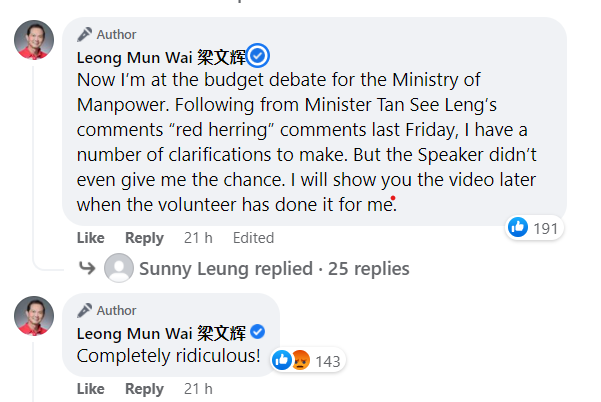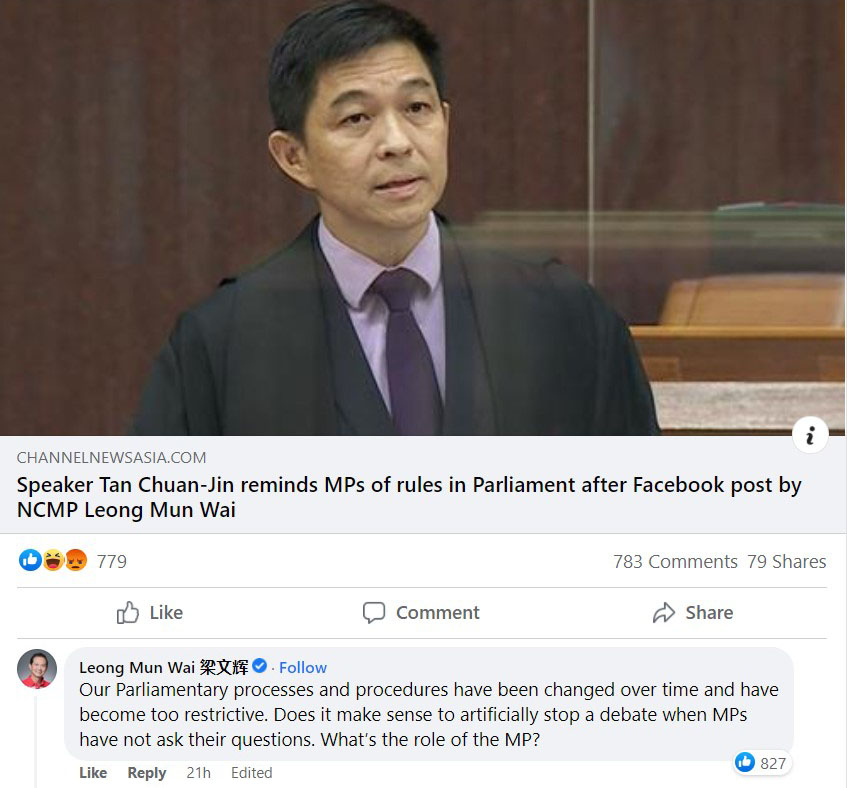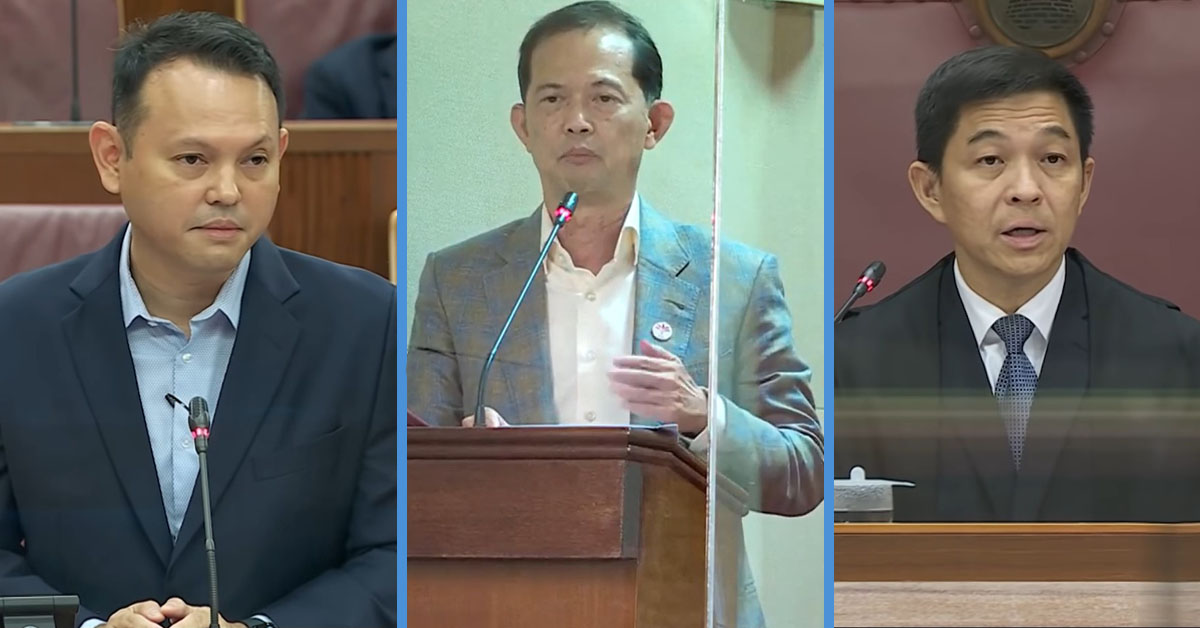During the Parliament Session on 8 March, Deputy Leader of the House Zaqy Mohamad called upon Non-Constituency Member of Parliament (NCMP) Leong Mun Wai to apologise and take down his Facebook post and comments which alleged that the Speaker of Parliament had prevented him from asking for clarifications in the House.
Mr Mohamad states that Mr Leong’s social media posts have impugned the Speaker of the Parliament and the process of the process of the Parliament, while also misrepresenting how the debate proceedings for the Ministry of Manpower (MOM) had ended on Monday (7 Mar).
The Workings of Parliament Debate
Before getting into the MPs and Speaker’s fixation on the topic and thus their urgency to address the misgivings and misunderstandings, let’s just recap how Parliament debates work.
As explained by Speaker of the Parliament Tan Chuan-Jin, the structure of debates for each Ministry’s budget debates in scheduled and allocated time periods is as follows:
- 40% is allocated to MP’s short speeches
- 50% is given to responses from Ministries
- 10% is set aside for clarifications.
The debate on each budget ends once the respective cut-off time is reached, according to the Parliament’s Standing Order 97(A).
The Speaker’s responsibility in the Parliament is to ensure that the Standing Order proceeds as scheduled, which means that the Speaker is obligated to end the respective debates once the time allocated is up.
Moreover, Speaker Tan clarifies that the time allocated to each Ministry’s debate is decided beforehand and every MP is informed of the Order Paper and cut-off times for each segment in advance.
In fact, the Order Paper is open to the public for viewing too, just before the Parliament Session commences.
The amount of time allocated to each debate is usually dependent on the number of enquiries from the MPs, then how much time the Ministry might require to answer the questions, and finally leaving some time for the clarifications.
In simpler terms, think of it like your timetable in school: your science class is 1½ hours long, your following English class is one hour, then you have your recess for half an hour.
The Speaker of the Parliament is the loud bell which signals the end and transition to the next period.
For Government budget debates especially, Guillotine Times feature prominently during debates in the Committee of Supply (COS), and are strictly enforced, because the House must complete debates on the estimates of expenditure within a stipulated number of days.
Essentially, they’re running a tight schedule; the Parliament really doesn’t have additional time to entertain every question.
Onto Mr Leong’s Misrepresentation
With that information in mind, we can go into NCMP Leong Mun Wai’s Facebook comments and posts.
Right after the Ministry of Manpower’s (MOM) debate, Mr Leong commented on Facebook that he “…had a number of clarifications to make. But the speaker did not even give me a chance.”
One minute later, he adds, “Completely ridiculous!”

His comments on Facebook immediately drew Speaker Tan’s attention, such that the Speaker went as far as addressing the issue before the Parliament session dispersed for their tea break.
Speaker Tan first explained the Parliament processes and expressed his understanding that the MPs are very passionate about verbalising their opinions.
However, given the limited time allocated to each debate, it is also the Speaker’s onus to ensure that different members have opportunities to air their views; a balancing act which often comes at the expense of some MPs being unable to voice their questions.
In the case of MOM’s debate, there had been 10 MPs and other speakers that were given the opportunity to speak.
Alas, despite the Speaker’s best attempts to accommodate and acknowledge every raised hand, there were other people who didn’t make it to the speaker’s podium as well, like Mr Edward Chia, Ms Janet Ang, Mr Melvin Yong, Ms Yeo Wan Ling, and Mr Leon Perera.
Ergo, it wasn’t out of inherent biases that Mr Leong wasn’t called upon: there were just a lot of questions and not enough time.
As a matter of fact, 30 and a half minutes were allocated for clarifications, but Speaker Tan had extended the time to 48 minutes at his own discretion, until there was no choice but to move on with the agenda.
Should MPs have more queries, they are always free to send the questions to the Ministries for written replies and clarifications.
In spite of Speaker Tan’s explicit clarification, Mr Leong goes ahead with his own narrative, uploading a 34-second video on Facebook in the evening with the title “This is how Speaker prevents a member from speaking”.
The video has been taken down during the editing process of the article, but you can still check out the specific moment with this linked timestamp, or refer to the short transcript below:
SPEAKER: End of clarifications, Mr Desmond Choo, would you like to withdraw your amendment?
MR LEONG: Uh, Chairman, point of order, Chairman. I would still like to ask some questions.
SPEAKER: Time’s up. Thank you, Mr Desmond Choo, please proceed.
MR LEONG: Chairman, I said there are still questions. The debate is not over when there are still questions.
SPEAKER: Mr Leong, we’re moving on. Thank you, Mr Desmond Choo.
Apart from posting this video, Mr Leong makes another comment below CNA’s clip of Speaker Tan reminding MPs of the Parliament rules in response to Mr Leong’s afternoon comments.
Mr Leong writes, “Our Parliamentary processes and procedures have been changed over time and have become too restrictive. Does it make sense to artificially stop a debate when MPs have not ask their questions. What is the role of the MP?”

Mr Leong, even in debating competitions, the three speakers of the proposition and opposition teams are only given eight minutes to speak each, whilst the last reply speaker only has four minutes to conclude the case.
If every question needs to be addressed, do you want to Parliament session to drag on until midnight?
Or do you want to imitate the American example where Kevin McCarthy purposefully stood on the floor for 8 hours and 33 minutes just to oppose an act?
Join our Telegram channel for more entertaining and informative articles at https://t.me/goodyfeedsg or download the Goody Feed app here: https://goodyfeed.com/app/
Breach of the Parliament (Privileges, Immunity, and Powers) Act
The main problem with Mr Leong’s Facebook comments and posts, according to Mr Zaqy Mohamad, is that they seem to insinuate that Speaker Tan could have called upon Mr Leong but deliberately chosen not to do so “for improper reasons”.
For that alone, it falsely accuses Speaker Tan of lacking integrity and attacks his character, as well as misrepresents how the Committee of Supply (COS) proceedings for the MOM debate had ended yesterday.
In other words, Mr Mohamad declares that Mr Leong’s actions were “dishonourable” and shows “contempt of the Parliament”, which breaches the Parliament (Privileges, Immunity, and Powers) Act.
More specifically, Mr Mohamad should be referring to Section 31(g) which states the following: “No person shall publish any statement, whether in writing or otherwise, which falsely or scandalously defames, or which reflects on the character of, the Speaker or any Member touching on his conduct in Parliament or anything done or said by him in Parliament.”
After all, Speaker Tan was merely exercising his responsibilities and rights as the Speaker of the Parliament by ending the debate at the cut-off time, not deliberately discriminating against any MP.
Mr Leong Told to Take Down the Posts or Face Consequences
For those reasons, Deputy Leader of the House Zaqy Mohamad reprimanded Mr Leong for his conduct with strict words, and proceeded to make three demands:
- Take down the video, and the accompanying caption and post
- Take down his two Facebook comments made on 12:52pm and 12:53pm on 7 March 2022
- Apologise before this House and via a Facebook post in the following terms:
“I sincerely and unreservedly apologise to the Speaker in this House for my Facebook comments of 12.52pm and 12.53pm on 7 March, 2022, and the video I posted at 6.55pm on 7 March, 2022, and the statements therein which impugn the Speaker and the processes of Parliament without any basis.
“I have taken the posts down, I withdraw what I said in them and undertake not to repeat such words and actions again. I acknowledge that I had not set up all the facts in my posts, and thus gave a misleading impression.”
Mr Leong was warned by Mr Mohamad to accomplish the following by the end of today’s Parliament seating (8 March 2022).
Depending on Mr Leong’s response, the Parliament will decide on whether further steps need to be taken.
However, it should be noted that Mr Leong was not in the parliament chambers when Mr Mohamad and Speaker Tan made their speeches.
Nevertheless, Mr Mohamad asserts that Mr Leong will be formally notified of these statements and requests, and added that he will ensure that it will be brought to his attention.
Under the aforementioned act, the Parliament may punish an MP for any dishonourable conduct, abuse of privilege or contempt.
He may be imprisoned for a term not exceeding the current term of the Parliament, give him a maximum fine of $50,000, suspend him for the remaining term of the Parliament or for a part of it, or have him be admonished or reprimanded by the speaker.
Read Also:
- Indonesian Billionaire Personally Issued $100k Cheque After Reading News About Boy with Leukaemia
- Russia Has Included S’pore in a List of Countries That Commit ‘Unfriendly Actions’ Against Russia
- Post-Mortem Examination Indicates That 25YO NSman Has Passed on Due to Coronary Artery Disease
- Woman Stayed With Uncle Who Was Trapped in an HDB Lift
Featured Images: YouTube (MCI Singapore)
